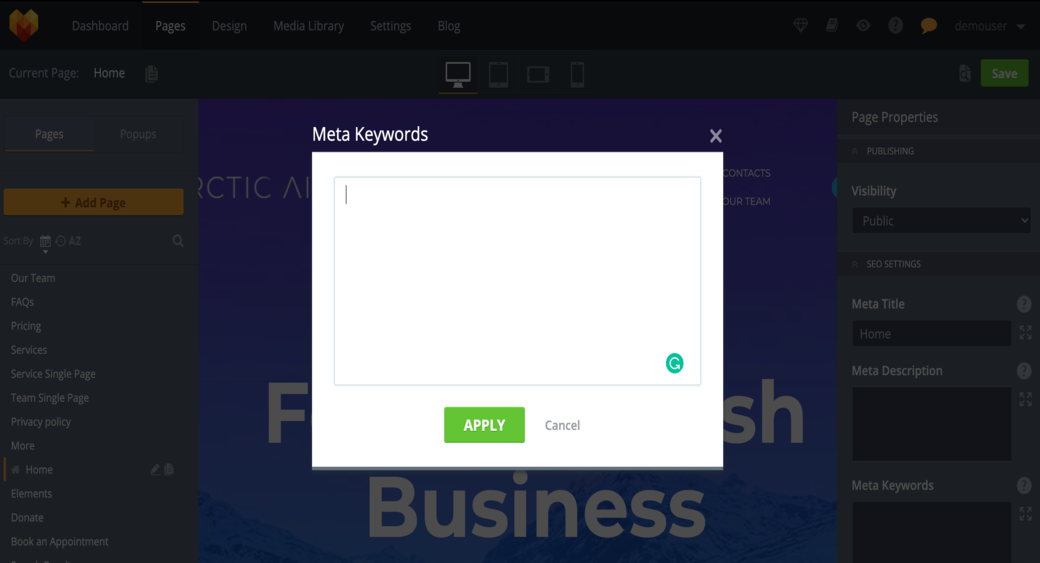Beginners Guide to SEO – 10 Things You Should Know If You Are New to Optimization
If you want your website to be easily found through search engines like Google, you will need to check out our beginners guide to SEO, which. is full of comprehensive information about on-page SEO optimization service for websites. MotoCMS has set up a complete introduction and overview of search engine optimization for you. You can find here the description of all major SEO aspects (from finding the keywords that can generate qualified traffic to your website, to making your site friendly to search engines and marketing the unique value of your platform).
Get ready to get the best out of this beginner’s guide to SEO! Combine the obtained information with some practice, and you won’t even notice when becoming a real SEO guru.

Essentials You Will Learn in Our Beginners Guide to SEO
If you are a total newbie in SEO and have no idea what to start with, it is crucial to deal with its basics before diving into specific SEO techniques and aspects. Training in the basic principles of search engine optimization won’t take you much time if you choose beginners’ guide to SEO from MotoCMS. You can improve your ranking significantly even with essential practices, but first, start with defining what SEO is.
What Is SEO and Why Is It So Important?
Search engine optimization (SEO) is a process of improving positions in organic search results in search engines like Google. It includes a perfect structure or technical background of the website, and well-optimized, quality content tailored to the needs of your audience. Professional content optimization increases your website chances to rank high for specific keywords. The higher your site and content ranking on Google, the more people will click on it and visit the platform, which allows you to raise your incomes significantly.
The world of search engine optimization has been continuously changing and growing; however, certain essential principles remain unchanged:
- crawl accessibility;
- compelling content;
- keywords availability;
- fast load speed;
- the presence of titles, URLs, and meta descriptions.
To make your SEO efforts more effective from the start, it’s important to have a clean and SEO-friendly website structure. That’s why many beginners use ready-made templates optimized for search engines, like those offered by Weblium. Their templates are designed with SEO best practices in mind—mobile responsiveness, fast load times, clean code, and proper heading hierarchy—all of which support your chances of ranking higher in search results right from day one.
Beginners Guide to SEO: Fundamental SEO Categories
There are two broad categories of SEO: on-page SEO and off-page SEO. Our beginners guide to SEO will walk you through on-page SEO practices mostly; however, you’d better know the principles of both search engine optimization categories.

What is Off-Page SEO?
Off-page SEO refers to all variables search engines pay attention to. They depend on sources like social networks, similar themes relating to blogs, and the personal history of the searcher. Off-page SEO covers the activities you can do to improve your website’s SEO ranking by getting backlinks from other websites, and considering the latest SEO trends. Look through the list of methods that will affect your site’s SEO authority:
- guest blogging;
- submissions;
- cooperation with influencers;
- writing valuable content;
- and social media efforts.
These methods will help you to get higher on Google; however, they are only a supplement to On-page SEO, which occupies a special place in the MotoCMS beginner’s guide to SEO.
What is On-Page SEO?
On-page SEO is the practice of optimizing web page content for search engines and users, which includes:
- meta tags and headings;
- URL structure;
- image SEO;
- structured data;
- website size and speed;
- content, and more.
On-page SEO is different from Off-page SEO, which is optimizing for signals like backlinks that happen off of your site. This SEO category relates to all of Google’s ranking factors that they define by a direct look at the page you aim to optimize. For agencies or professionals offering White Label SEO services, mastering On-page SEO principles is essential to deliver quick and efficient results to their clients. Start with these principles to see impactful outcomes right away!
10 Tips for Beginners – Guide to SEO From the Leading Specialists
Beginners guide to SEO from MotoCMS is an awesome resource for those who want to use SEO for branding and promoting business both locally and internationally. To make this beginners’ guide to SEO as powerful and valuable as possible, we included ten essential tips from New York local SEO expert that will help each newcomer to achieve the highest results. Look through the list of our recommendations to avoid basic mistakes like an expert and effectively grow your business within the shortest possible time.

1. Make Your Site Work Fast by Removing Anything That Slows It Down
The time when people were ready to wait for the web page loads has long gone. Today users won’t stay at the website if it works slowly; therefore, it is crucial to monitor the site’s speed.
A slow page can frustrate your potential client experience and discourage people from buying your product or service. As the Strange Loop data shows, a mere 1-second delay in page load can cause a whopping 7% loss in conversions, or even more. To prevent such losses, you should get rid of non-essential elements that slow down your platform:
- Deactivate unnecessary plugins you may have installed but don’t need.
- Declutter your sidebar so that it contained only essential widgets there.
- Check out how quickly your site loads and how quickly crucial elements become available to the website visitors.
Look through the details obtained in the advanced breakdown review for additional guidance. Check the “speed index” to figure out how quickly the content of a page is visibly populated. Low speed can be one of the main reasons your website visitors are leaving because they don’t want to wait for your content to open. Increase your current speed index at least by 0.5s to improve traffic to your website and boost the target audience.
2. Do Your Best to Figure Out What Your Customers Are Searching for
It’s hard to optimize the website without knowing what your target audience is searching for. Therefore, you should learn how to determine the essential needs of your prospective customers with our beginners’ guide to SEO. We offer you to figure out your clients’ requirements using the following methods:
- Define the most popular way users search for what you do by doing a Google search for one of the words or phrases that associate with your business.
- Look at Google autocomplete results deeper into searches people make about your website.
- Find popular and engaging topics in your field to make your business more demanded.
- Expand your keyword list by looking at forums, Facebook or LinkedIn groups, and any website or social network with a large number of visitors.
- Understand the metrics behind the keywords you target.
To gain success in SEO, you have to figure out how people are talking about the niche you’re operating in, what their interests and problems are, and more. Interact with customers to make your business popular and recognizable worldwide.
3. Make Your Website Accessible to Both Humans and Search Engines
If you still consider that manipulating search engines with long-tail keywords is an excellent way to rank higher, it’s time to change your mind. Prioritizing search engines over the actual humans reading your work is the wrong approach. It is much better to create content for users, as every website visitor can become your potential client. Strive to help people in fulfilling their needs and success won’t be late!
Forget about Google and other search engines when you’re writing content for your blog or site, do SEO copywriting instead. Once you create helpful content, search engines will reward you with a high ranking. This thought is probably one of the essential ideas of our beginners’ guide to SEO, as it can help you to enhance the user experience and build trust with your target audience.
4. Link to Other Relevant Sites and Encourage Them to Link to You as Well
Link building is a fundamental part of the smart search engine optimization strategy. Don’t expect excellent and popular blogs that relate to your topic will refer to your articles if you are not ready to attach the link to other sources as well. Showcase your willingness to share valuable information with the audience, even if this info belongs to your competitors. Thus, you will be able to get inbound links from authoritative blogs, which will make your website a more valuable and scalable resource.
Nevertheless, if you are going to create links in large numbers, it won’t work for your business in the right way. As a reliable beginners’ guide to SEO, we recommend only qualitative link building, and following proven link building tips, which can build more trust in your niche.
5. Optimize Your URLs to Make Them Meaningful Following Our Beginners Guide to SEO
Linking out to other blogs and platforms is critical to your business growth, as this allows you to extend the audience effectively. Therefore, it is vital to provide a readable URL, which is easy to understand, for both users and search engines. Avoid numbers or characters, other than the words and dashes. Include your website’s URL 2 or 4 words to make it memorable to the user, search engine-friendly, and easy to type. Follow these recommendations of our beginners’ guide to SEO to make your URL catchy and recognizable on the web.
6. Create Unique and Relevant Titles and Meta Descriptions for Each Page
One of the essential tips of beginners’ guides to SEO that most people neglect is the well-crafted title and meta description. These two elements are the first thing website visitors, and search engines see when you load the content to your platform; therefore, you should ensure they meet several Google requirements:
- your meta description has to be relatively short and unique;
- you can’t load the same meta description to various pages;
- the content from your meta description can’t be duplicated from another site.

The title and meta description are the first sections that people see when your page gets into the search engine list. That’s why your task is to make them catchy, informative, and attractive for users and potential clients. Once you learn how to create these elements properly, your web pages will instantly rise on Google.
7. Optimize Your Web Pages for Your Main Target Keywords
Keyword research is a significant step towards attracting more organic search traffic. However, they won’t bring excellent results if your content is not optimized for search engines. Make sure your pages are structured well to satisfy the users behind the search to rank for the keywords you selected.
This section of our beginners guide to SEO will teach you how to optimize your website pages within several simple steps:
- Use creative design and typography to build the user experience (UX) that will satisfy your visitors.
- Create content that will align with ‘search intent’.
- Use headers and subheaders to form a logical structure.
- Optimize the images you want to load to your website.
Follow these tips to take advantage of your primary target keywords and increase your website ranking in just a few clicks.
8. Create and Publish Unique Content to Improve Your Rankings
Creating unique and engaging content is a challenge for most people. You have to be disciplined and comply with, particularly when it comes to content creation; otherwise, this won’t give you any good results.
If you have read MotoCMS beginners guide to SEO attentively, you must have noticed that the success of your business relates to many factors, but the content is one of the most important ones. The more relevant and useful information you provide, the higher your website rank will be. This is the key idea of this section of our beginners’ guide to SEO. You may also look through the SEO optimized content writing tips provided by MotoCMS specialists in search engine optimization.
9. Optimize Your Social Media for Attracting More Clients
In our beginner’s guide to SEO, MotoCMS specialists have repeatedly pointed out the importance of linking, which allows developing a website and its content in particular. However, social media is also an integral part of the SEO strategy, as well as search signals. Although Google hasn’t added social signals into the ranking algorithm factors, social signals do impact search engine rankings. Focus on this SEO aspect to promote your business using social shares, likes, tweets, and pins on search engine rankings.
Check out our advice on getting more social signals to get additional benefits from this beginners guide to SEO
- Create useful content that’s worth sharing on your social media platforms.
- Include share buttons to your posts and make them visible to your audience.
- Run a social media contest to obtain more shares from both loyal customers and new users.
- Link to social media influencers in your post and notify them to extend your target audience.
Grow your social media presence to attract new clients and increase the incomes of your company.
10. Start Tracking and Measuring Your SEO Results Using Beginners Guide to SEO
Once you check out the ultimate beginners’ guide to SEO and understand how to write useful SEO content, it’s high time to put all of these steps into motion. However, there is also one thing you need to figure out before proceeding to content creation. Determine how you are going to track and measure SEO results, using the following metrics:
- keyword rankings;
- organic traffic;
- or organic leads & sales.
No matter how you track your rankings on Google, the critical advice of our beginners’ guide to SEO is to focus on the basics.
Common Technical SEO Issues and How to Prevent Them

To make the SEO basics more valuable and useful, you can add technical SEO for larger, more complicated sites. Except for the website speed we mentioned above in our beginners’ guide to SEO, there are also several things you must to consider:
Mobile Friendliness
In some niches, mobile traffic already outweighs desktop traffic; therefore, you should pay attention to the mobile compatibility of your website when you’re trying to make it SEO friendly. Use Google free tools to determine what kind of mobile search engine traffic is coming to your website, and find a way to improve it.
Header Response
Header response codes are a relatively difficult technical SEO part, yet essential. Make sure your working pages are returning the correct code to search engines (200). If this will be another code (404), your website most likely is no longer present and can’t be found on Google.
Duplicate Content
Another vital part of our beginners guide to SEO is duplicate content. By putting the same or near-identical content on multiple pages, you’re diluting the link between two pages instead of concentrating it on one page. Thus, you obtain fewer chances of ranking for competitive phrases with websites that don’t duplicate their content. Avoid large quantities of recurrence, if you don’t want your site to look low-quality. Better hire a professional team of copywriters and let them create unique text content for your website pages.
Final Thoughts About Our Beginners Guide to SEO
Today, a beginner’s guide to SEO is in great demand, as search engine optimization is considered one of the most effective ways to drive sustainable traffic to your website. The effect from efforts you waste on optimizing your online platform for search will add up over time, helping you increase the traffic and extend the client base. Useful tips mentioned in the beginners’ guide to SEO from MotoCMS will help you to achieve excellent results in SEO, just don’t forget to use them routinely.




Leave a Reply